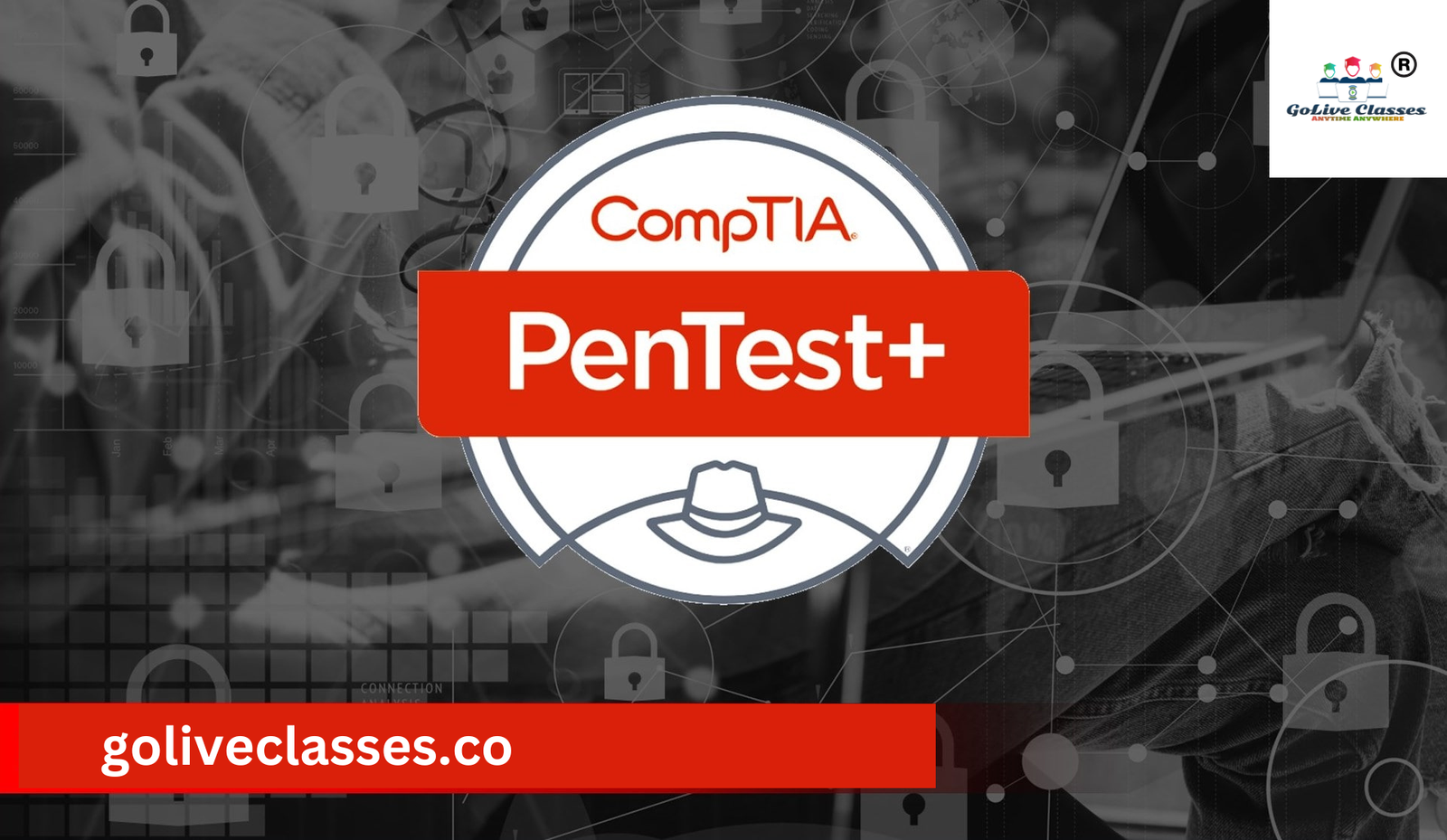CompTIA-PenTest Training
Golive Classes, a leading training company to learn Competia-pentest course and certification with real-time project material, useful notes, and details.
About Course
Master CompTIA-PenTest course online with Golive Classes. We provide the best CompTIA-PenTest trainings online in Hyderabad and other states in India.
Are you interested in pursuing a career in cybersecurity? Do you want to enhance your knowledge and skills in penetration testing?
Look no further than CompTIA-PenTest! In this article, we will explore the world of CompTIA-PenTest, its significance in the cybersecurity industry, and how it can help you establish a successful career as a penetration tester. So, let’s dive in!
CompTIA-PenTest is a certification offered by the Computing Technology Industry Association (CompTIA). It focuses on validating the skills and knowledge required to identify vulnerabilities, assess risks, and conduct penetration tests to ensure the security of computer systems and networks. This certification is highly regarded in the cybersecurity community and is a testament to an individual’s expertise in penetration testing.
What are the objectives to learn Comptia Pentest+ Training
The objectives of CompTIA Pentest+ training encompass a comprehensive set of skills and knowledge required for individuals aiming to become proficient in penetration testing and ethical hacking. Here are the key objectives of CompTIA Pentest+ training:
- Understanding Penetration Testing Fundamentals: Participants will gain a solid understanding of the fundamental concepts and principles of penetration testing, including its purpose, methodology, and ethical considerations.
- Learning the Penetration Testing Process: Training will cover the step-by-step process of conducting penetration tests, from initial reconnaissance and information gathering to vulnerability assessment, exploitation, and reporting.
- Exploring Penetration Testing Tools and Techniques: Participants will learn how to use a variety of penetration testing tools and techniques effectively, including network scanning tools, vulnerability scanners, exploit frameworks, and password cracking tools.
- Identifying and Exploiting Network Vulnerabilities: Training will focus on identifying common network vulnerabilities and misconfigurations, such as open ports, weak passwords, misconfigured services, and insecure network protocols. Participants will learn how to exploit these vulnerabilities to gain unauthorized access to systems and networks.
- Assessing Web Application Security: Participants will learn how to assess the security of web applications by identifying common vulnerabilities, such as SQL injection, cross-site scripting (XSS), cross-site request forgery (CSRF), and insecure direct object references (IDOR). They will also learn how to exploit these vulnerabilities to compromise web applications and extract sensitive information.
- Conducting Social Engineering Attacks: Training will cover the principles and techniques of social engineering, including phishing, pretexting, tailgating, and dumpster diving. Participants will learn how to manipulate human behavior to gain unauthorized access to systems and sensitive information.
- Performing Wireless Network Penetration Testing: Participants will learn how to assess the security of wireless networks by identifying common vulnerabilities, such as weak encryption, rogue access points, and misconfigured security settings. They will also learn how to exploit these vulnerabilities to gain unauthorized access to wireless networks.
- Understanding Cryptography and Cryptanalysis: Training will cover the principles of cryptography and cryptanalysis, including encryption algorithms, cryptographic protocols, and cryptographic attacks. Participants will learn how to analyze cryptographic systems and identify weaknesses that can be exploited during penetration testing.
- Documenting and Reporting Penetration Test Findings: Participants will learn how to document their penetration test findings effectively and prepare comprehensive reports for stakeholders. Training will cover report writing best practices, including formatting, content organization, and language use.
- Preparing for the CompTIA Pentest+ Certification Exam: The ultimate objective of CompTIA Pentest+ training is to prepare participants to pass the CompTIA Pentest+ certification exam. Training will cover the exam objectives comprehensively and provide participants with the knowledge and skills needed to succeed on the exam.
Who can Learn Comptia Pentest+ Course
The CompTIA Pentest+ course is suitable for individuals who are interested in pursuing a career in cybersecurity, particularly in the field of penetration testing and ethical hacking. Here are the key groups of people who can benefit from learning CompTIA Pentest+:
- Cybersecurity Professionals: Cybersecurity professionals who want to specialize in penetration testing and ethical hacking can benefit from CompTIA Pentest+ training. It provides them with the knowledge and skills needed to assess the security posture of systems and networks, identify vulnerabilities, and recommend remediation measures.
- IT Professionals: IT professionals, including system administrators, network administrators, and security analysts, can benefit from CompTIA Pentest+ training to enhance their understanding of cybersecurity principles and practices. It enables them to proactively identify and mitigate security risks within their organizations.
- Security Consultants: Security consultants who provide consulting services to clients on cybersecurity matters can benefit from CompTIA Pentest+ training to expand their service offerings. It equips them with the expertise to conduct penetration tests, assess security controls, and develop actionable recommendations for improving security posture.
- Ethical Hackers: Ethical hackers, also known as white-hat hackers, who are interested in legally and ethically hacking into systems to identify vulnerabilities can benefit from CompTIA Pentest+ training. It provides them with the knowledge and skills needed to perform penetration tests and security assessments in a controlled and responsible manner.
- Information Security Managers: Information security managers who oversee cybersecurity initiatives within their organizations can benefit from CompTIA Pentest+ training to better understand penetration testing methodologies and best practices. It enables them to assess the effectiveness of existing security controls and implement proactive measures to mitigate risks.
- Risk Management Professionals: Risk management professionals who are responsible for identifying, assessing, and mitigating cybersecurity risks can benefit from CompTIA Pentest+ training to gain insight into common security vulnerabilities and threats. It equips them with the knowledge needed to make informed decisions about risk management strategies.
- Students and Graduates: Students pursuing degrees in cybersecurity, computer science, information technology, or related fields can benefit from learning CompTIA Pentest+ as part of their academic curriculum. It provides them with valuable hands-on experience and prepares them for entry-level roles in cybersecurity.
- Career Changers: Individuals who are looking to transition into a career in cybersecurity can benefit from CompTIA Pentest+ training as a starting point. It equips them with foundational knowledge and skills that are highly sought after in the cybersecurity industry, opening up opportunities for entry-level positions.
What are the Prerequisites to Learn Comptia Pentest+ Course
To pursue CompTIA Pentest+ training effectively, it’s advantageous to have certain prerequisites in place to ensure a solid foundation for understanding the course material. Here are the typical prerequisites for learning CompTIA Pentest+:
- Foundational Knowledge in Networking: A basic understanding of networking concepts and protocols is beneficial for comprehending the intricacies of penetration testing. Familiarity with topics such as IP addressing, subnetting, TCP/IP, DNS, DHCP, and routing protocols provides a solid groundwork for understanding network vulnerabilities and exploitation techniques.
- Understanding of Operating Systems: Proficiency in operating systems, particularly Windows and Linux, is essential for conducting penetration tests effectively. Knowledge of operating system architecture, file systems, user permissions, and command-line interfaces enables penetration testers to identify and exploit vulnerabilities in target systems.
- Knowledge of Cybersecurity Fundamentals: Familiarity with cybersecurity principles, terminology, and best practices is important for understanding the context and significance of penetration testing. Knowledge of topics such as cryptography, access control, authentication, and security policies provides a framework for assessing security risks and implementing countermeasures.
- Experience with Security Tools: Prior experience with security tools and utilities commonly used in penetration testing is advantageous. Familiarity with tools such as Nmap, Wireshark, Metasploit, Burp Suite, and John the Ripper enables penetration testers to conduct comprehensive assessments and identify security vulnerabilities effectively.
- Basic Scripting and Programming Skills: Basic scripting and programming skills in languages such as Python, Bash, or PowerShell can enhance the effectiveness of penetration testing activities. Knowledge of scripting enables penetration testers to automate repetitive tasks, develop custom exploit scripts, and analyze security-related code.
- Critical Thinking and Problem-Solving Skills: Strong critical thinking and problem-solving skills are essential for conducting penetration tests effectively. Penetration testers must be able to analyze complex systems, identify potential attack vectors, and devise creative solutions to exploit vulnerabilities and achieve testing objectives.
- Ethical and Professional Conduct: Ethical behavior and adherence to professional standards are paramount in the field of penetration testing. Penetration testers must understand the ethical considerations involved in conducting security assessments, respect the privacy and confidentiality of sensitive information, and adhere to legal and regulatory requirements
What are the job opportunities in Comptia Pentest+
Job opportunities in CompTIA Pentest+ encompass a wide range of roles within the cybersecurity domain, particularly in the field of penetration testing and ethical hacking. Here are some common job opportunities for individuals skilled in CompTIA Pentest+:
- Penetration Tester: Penetration testers, also known as ethical hackers, are responsible for identifying and exploiting security vulnerabilities in systems, networks, and applications. They conduct comprehensive security assessments, perform penetration tests, and provide recommendations for remediation to enhance the overall security posture of organizations.
- Security Consultant: Security consultants provide advisory services to clients on cybersecurity matters, including penetration testing, risk assessments, and security audits. They assess the security needs of organizations, develop customized security solutions, and advise on best practices for mitigating security risks and improving resilience against cyber threats.
- Security Analyst: Security analysts monitor and analyze security events and incidents to detect and respond to cybersecurity threats. They conduct security assessments, perform vulnerability assessments, and collaborate with penetration testers to identify weaknesses in security controls and recommend appropriate countermeasures.
- Security Engineer: Security engineers design, implement, and maintain security solutions to protect systems, networks, and data from cyber threats. They configure firewalls, intrusion detection systems, and other security tools, conduct security assessments, and collaborate with penetration testers to strengthen security defenses and mitigate risks.
- Cybersecurity Specialist: Cybersecurity specialists focus on protecting organizations from cyber threats by implementing security measures, conducting security assessments, and responding to security incidents. They work closely with penetration testers to identify vulnerabilities, develop security policies, and implement security controls to safeguard against cyber attacks.
- Incident Response Analyst: Incident response analysts investigate and respond to cybersecurity incidents, such as data breaches, malware infections, and unauthorized access attempts. They analyze security logs, conduct forensic investigations, and collaborate with penetration testers to identify the root cause of incidents and prevent future occurrences.
- Security Operations Center (SOC) Analyst: SOC analysts monitor and analyze security alerts and events to detect and respond to potential security incidents. They triage security alerts, investigate suspicious activities, and coordinate with penetration testers to assess the severity of threats and take appropriate remedial actions.
- Cybersecurity Auditor: Cybersecurity auditors assess the effectiveness of security controls and practices within organizations to ensure compliance with regulatory requirements and industry standards. They conduct security audits, evaluate security policies and procedures, and collaborate with penetration testers to identify gaps in security defenses and recommend improvements.
- Forensic Analyst: Forensic analysts specialize in investigating cybercrime incidents and collecting digital evidence for legal proceedings. They conduct digital forensic investigations, analyze electronic devices and data, and collaborate with penetration testers to reconstruct security breaches and attribute cyber attacks to specific perpetrators.
- Security Trainer/Educator: Security trainers and educators provide training and education to individuals and organizations on cybersecurity topics, including penetration testing techniques, best practices, and tools. They develop training materials, deliver workshops and courses, and mentor aspiring cybersecurity professionals to enhance their skills and knowledge in CompTIA Pentest+ and related areas.
Why choose Golive Classes?
Golive classes we provide:
- Real-time concepts with case studies
- Project Explanation
- Interview Questions
- Resume preparation
- Technical Assistance even after Course Completion
- Career Guidance
- Life time access to video recordings.
- The assistance provides in consulting and placement
- Free other courses will be provided free of cost.
comptia pentest+ syllabus
Module 1: Planning and Scoping
> Compare and contrast governance, risk, and compliance concepts
> Explain the importance of scoping and organizational/customer requirements.
> Given a scenario, demonstrate an ethical hacking mindset by maintaining professionalism and integrity.
Module 2: Information Gathering and Vulnerability Scanning
> Given a scenario, perform passive reconnaissance.
> Given a scenario, perform active reconnaissance
> Given a scenario, analyze the results of a reconnaissance exercise
>Given a scenario, perform vulnerability scanning
Module 3: Attacks and Exploits
> Given a scenario, research attack vectors and perform network attacks
> Given a scenario, research attack vectors and perform wireless attacks
> Given a scenario, research attack vectors and perform application-based attacks.
>Given a scenario, research attack vectors and perform attacks on cloud technologies.
>Explain common attacks and vulnerabilities against specialized systems
>Given a scenario, perform a social engineering or physical attack
>Given a scenario, perform post-exploitation techniques
Module 4: Reporting and Communication
> Compare and contrast important components of written reports
> Given a scenario, analyze the findings and recommend the appropriate remediation within a report.
> Explain the importance of communication during the penetration testing process
> Explain post-report delivery activities
Module 5: Tools and Code Analysis
> Explain the basic concepts of scripting and software development.
> Given a scenario, analyze a script or code sample for use in a penetration test.
> Explain use cases of the following tools during the phases of a penetration test.
CompTIA-PenTest Course Content Download Link
Want to book a Demo for this awesome CompTIA-PenTest Course? Click Register.
Course Content
Module 1: Planning and Scoping
-
Compare and contrast governance, risk, and compliance concepts
-
Explain the importance of scoping and organizational/customer requirements
-
Given a scenario, demonstrate an ethical hacking mindset by maintaining professionalism and integrity












